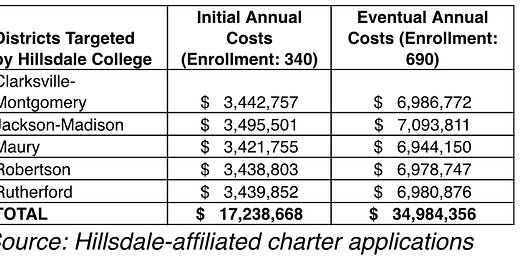Hillsdale's $35 Million Money Grab
Rural, suburban taxpayers could be stuck with huge bill from charter school expansion
The Education Report is nearing 2000 subscribers! Thank you! If you enjoy these updates and want to help support this content, please consider becoming a paid subscriber at the link below. Please also be sure to share this post with anyone you know who is a defender of public education.
I’ve written before about plans for a massive expansion of charter schools in Tennessee starting this year.
I’ve also written about private, Christian Hillsdale College - based in Michigan. It’s a small school with big dreams. Specifically, its operators dream of converting Tennessee tax dollars into private profits by way of operating charter schools.
A new analysis by Public School Partners (a group I’m a member of) reveals that the total local taxpayer cost of Hillsdale’s five planned charter schools (in Madison, Maury, Montgomery, Robertson, and Rutherford counties) could reach $35 million.
Here’s more from Tennessee Education Report:
Five proposed charter schools affiliated with controversial Michigan-based Hillsdale College would drain more than $17 million from Tennessee suburban and rural public schools during their first year of operation and roughly $35 million per year at maximum enrollment, according to a new fiscal analysis by Public School Partners (PSP) and Charter Fiscal Impact.
As a result, the five taxpayer-funded privately run charter schools would trigger steep increases in local school districts’ budgets — with costs passed along to county commissions and, ultimately, local taxpayers. Absent significant amounts of new tax revenue, public-school students and families could be hurt as districts grapple with fixed costs stranded in existing schools — including hard-to-adjust expenses such as staffing, maintenance, transportation, and utilities.
“No matter how you run the numbers, the financial math on charter schools just doesn’t add up for Tennessee students, parents, and taxpayers. Privately run charter schools that aren’t accountable to elected local school boards significantly strain local budgets, which already are being stretched thin by inflation and other cost pressures.”
Dr. Donna Wright, a PSP co-founder and retired superintendent of Wilson County Schools
Here’s a breakdown by district of the first-year local cost created by these charters and the projected cost at full enrollment.
Fixed costs account for at least 40 percent of some school districts’ budgets. Nationwide, Moody’s Investors Service found that a growing number of school districts face “financial stress” due to fixed costs. In Nashville, an independent study found that charter schools would, “with nearly 100 percent certainty, have a negative fiscal impact” on the local school district’s budget.
While Hillsdale’s agenda is certainly concerning, it’s also worth noting that lawmakers are currently debating legislation that would allow an even greater expansion of charter schools - with essentially zero local input or accountability.
The charter school discussion highlights the local fiscal reality of charter schools and the larger school privatization movement: These are privately-run schools with minimal accountability subsidized by local taxpayers that may not want them.
There’s good reason to not want these charters, by the way.
As PSP notes:
Tennessee’s track record with charter schools is abysmal. For example, Vanderbilt University researchers found the state-run Achievement School District — one of the nation’s largest and most- controversial charter-school experiments — had “not produced positive effects” despite spending nearly $1 billion in state and local taxpayer money.
Tennessee’s charter-school law adds fiscal stress to a chronically underfunded education system. In 2022, Tennessee’s per-pupil funding level ranked 45th among 50 states and the District of Columbia — earning the state an ‘F’ grade from the Education Law Center. Similarly, the EdWeek Research Center gave Tennessee an ‘F’ in spending on public education.





